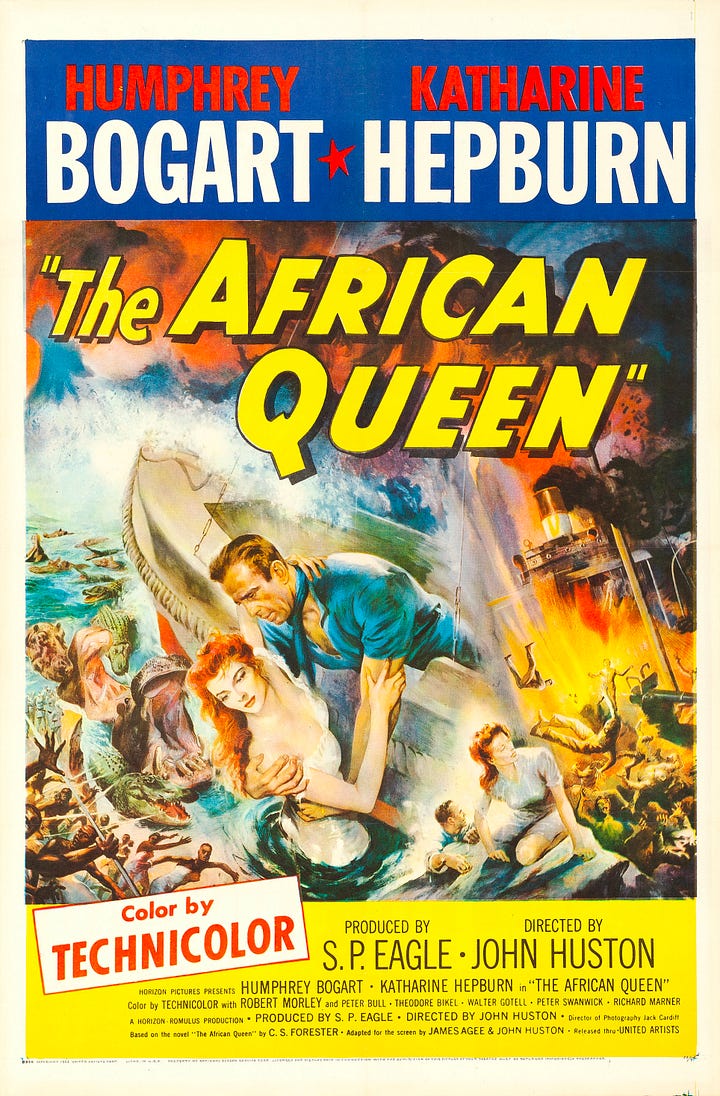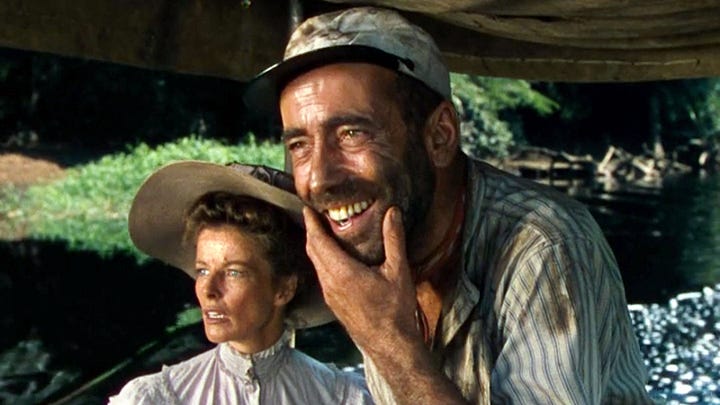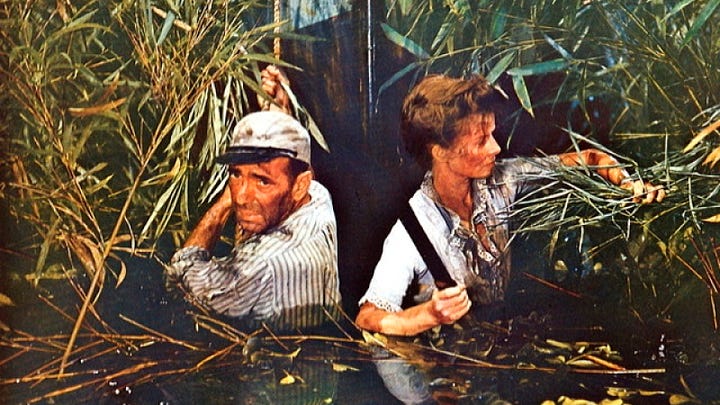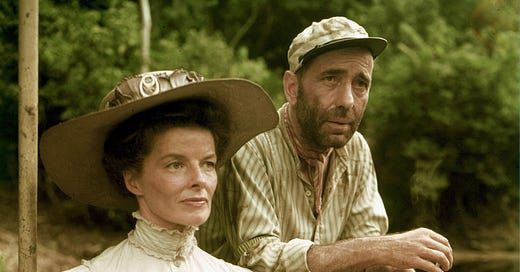THE AFRICAN QUEEN
1951 • John HustonCast: Humphrey Bogart, Katharine Hepburn, Robert Morley, Peter Bull, Theodore Bikel, Walter Gotell, Peter Swanwick, Richard Marner, Gerald Onn
Screenplay: John Huston, James Agee, Peter Viertel, John Collier; Based on The African Queen 1935 novel by C. S. Forester
Cinematography: Jack Cardiff
Music: Allan Gray
Producers: Sam Spiegel, John Woolf
United Artists
Nature, Mr. Allnut, is what we are put in this world to rise above.
The African Queen follows the adventurous journey of Rose Sayer (Katharine Hepburn) and Charlie Allnut (Humphrey Bogart) in German-controlled Africa during World War I. When Rose's missionary brother dies and their village is attacked by German forces, the unlikely duo, a prim and proper British woman, and a rough Canadian boat captain, escape in the titular steam-powered boat, The African Queen. Determined to strike a blow against the Germans by turning the boat into a makeshift torpedo, they embark on a perilous expedition down the Ulanga River, encountering treacherous rapids, wildlife, and enemy patrols. Along the way, the initially mismatched pair develops an unexpected romance, overcoming their differences and facing the challenges of the African jungle together.
Navigating a script dominated by the interplay of just two characters within a confined setting is a daunting challenge for any actor. Yet, this task was met with exceptional skill by the duo of the legendary Katharine Hepburn and Humphrey Bogart. Hepburn, with her indomitable spirit and refined British demeanor, brings Rose Sayer to life. She injects the character with depth and resilience, offering a stark contrast to the unconventional Canadian boat captain, Charlie Allnut. Bogart's rugged charm and versatility breathe life into the character, creating a compelling dynamic between the two protagonists that drives the entire film. The chemistry between Hepburn and Bogart becomes the beating heart of the film, turning what could have been a static, dialogue-heavy script into a mesmerizing exploration of character evolution and partnership. The exciting adventure didn’t hurt either.
The African Queen marked a shift in cinematic depictions of Africa, challenging and reshaping preconceived notions forged by studio backlot jungles, Tarzan movies and racist stereotypes. Director John Huston, seeking authenticity and a departure from the artificiality that plagued the portrayal of the African continent, made a bold decision that would define the film's legacy. In a daring move, Huston and his dedicated cast and crew ventured beyond the confines of Hollywood studios, immersing themselves in the lush landscapes of Uganda and the Congo. This ambitious decision transformed the film into a visual and sensory journey, capturing the raw beauty and untamed essence of the African terrain. The decision to shoot on location infused The African Queen with a genuine aesthetic. It also brought the cast and crew face-to-face with the challenges and wonders of the continent. The authentic presentation of the landscape, from the winding Ulanga River to the dense jungle foliage, not only served as a backdrop but also became an integral part of the storytelling.
The film is a mix of several genres. Adventure is at the core of the story, as Rose Sayer and Charlie Allnut navigate the challenging waters of the Ulanga River. The treacherous journey, fraught with natural obstacles and the looming threat of enemy forces, propels the characters into a series of gripping and unpredictable situations. The drama unfolds not only in the external conflicts but also within the characters themselves. The evolving dynamic between Rose, the refined British woman, and Charlie, the rugged boat captain, is fun to watch. Their transformation from initially mismatched companions to a united force facing the trials of war is a testament to the film's depth. Comedy is also interspersed throughout, often arising from the contrasts between Rose's prim sensibilities and Charlie's rough demeanor. The humor serves as a relieving counterpoint to the tension. Romance blooms amidst the chaos, with an unexpected and tender connection blossoming between Rose and Charlie.
Charlie's brokenness is evident initially, clearly an alcoholic who seems to have given up on life. However, as the story unfolds, his character undergoes a transformation. The catalyst for this change is the presence of Rose. Rose becomes the beacon of hope and happiness that Charlie desperately needs. Charlie, once resigned to the hardships of his circumstances, discovers a renewed sense of purpose and joy in Rose's company. Her optimism and resilience gradually mend Charlie's broken spirit, fostering a sense of hope that was previously elusive. Examples of this transformation are evident in subtle gestures, shared glances, and the gradual softening of Charlie's rough exterior as the connection between them deepens. It’s one of Bogart’s finest performances. Conversely, Rose, who initially represents a paradigm of virtue, finds unexpected love and meaning in Charlie's companionship. The raw authenticity of Charlie's character challenges Rose's preconceived notions, and she discovers a profound connection that transcends societal expectations. Rose's journey is one of self-discovery, as she learns to embrace love and fulfillment in unexpected places, ultimately finding a deeper, more genuine sense of purpose alongside Charlie.
You can find The African Queen’s DNA all over films in the decades that follow. The film's combination of contrasting personalities, perilous journeys, and unexpected romance has become a template for storytelling. Romancing the Stone (1984) and its sequel The Jewel of the Nile (1985) are adventure comedies, featuring Kathleen Turner as a successful romance novelist and Michael Douglas as a rugged adventurer. Like The African Queen, the films pair a refined woman with a rough-and-tumble guide, but instead of the Congo, they embark on a thrilling quest through the jungles of Colombia. Indiana Jones and the Temple of Doom (1984) borrows thematic elements as well with Indiana Jones teaming up with singer Willie Scott (Kate Capshaw), in a perilous journey that mirrors the adventurous spirit and unlikely romance found in the classic film. Although differing in tone and setting, Out of Africa (1985) starring Meryl Streep and Robert Redford, explores love and connection amid the challenges of the African landscape, albeit in different social contexts. The popular action/adventure blockbuster The Mummy (1999) features the charismatic pairing of Brendan Fraser and Rachel Weisz, once again drawing on the inspiration of a mismatched couple, this time navigating ancient Egyptian tombs and supernatural threats. Most recently, Disney's Jungle Cruise pays a modern homage to the classic adventure template set by The African Queen. Starring Dwayne Johnson and Emily Blunt, the film adapts the Disney theme park ride into a swashbuckling adventure of a a charismatic riverboat captain and yet another British female companion, this time a botanist, as they navigate perilous waters, supernatural threats, and the lush Amazon rainforest.
Notably, The African Queen holds a distinct place in Academy Award history as the film that earned Humphrey Bogart his first and only Oscar win. Bogart's portrayal of Charlie Allnut in this 1951 classic not only showcased his versatile acting prowess but also secured him the coveted golden statue. The Academy Award for Best Actor was a well-deserved and long-overdue recognition of Bogart's skill. While Bogart had delivered memorable performances throughout his career, (Casablanca, anyone?) it was The African Queen that solidified his legacy.
By the authority vested in me by Kaiser William the Second I pronounce you man and wife. Proceed with the execution.
Notable Accomplishments
Academy Award Winner: Best Actor - Humphrey Bogart
Academy Award Nominee: Best Director
Academy Award Nominee: Best Actress - Katharine Hepburn
Streaming: Pluto
Digital Rental/Purchase: Available for Rental Only at most digital retailers
Physical Media: Available on Blu-Ray and DVD.







